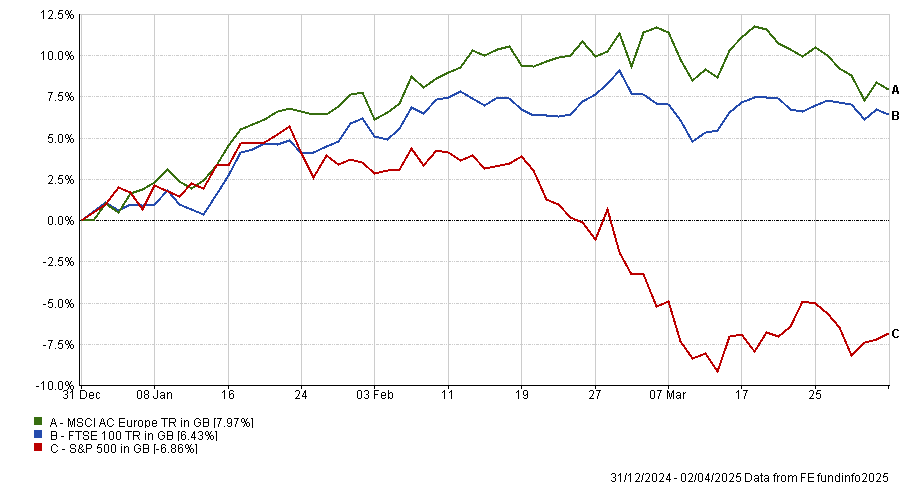As Donald Trump’s tariffs on all trading partners rewrite the rules of global trade, winners and losers are emerging, according to experts.
The UK, which will be subject to tariffs of ‘only’ 10%, appears to be a relative safe haven. ‘Tin hat stocks’, such as UK property and insurance companies, have the resilience to cope with the current turmoil, according to Simon Edelsten, chief investment officer of Goshawk Asset Management.
Gilt yields have fallen, which “makes UK debt interest lower, which is good, but also reflects lower growth prospects, which is bad”, Edelsten said. “Economically sensitive sectors such as banks and commodity stocks may not cope so well.”
James Henderson, co-manager of the Lowland Investment Company and Law Debenture, chipped in: “There will still be sectors for smart stock-pickers that will be relatively unaffected. Domestically focused UK companies are on such low valuations that this will be just noise for many of them.”
Dan Coatsworth, investment analyst at AJ Bell, agreed that the FTSE 100 still has some life in it, thanks to its more defensive names. “The FTSE 100 might have been in negative territory but it fell half the amount of Germany’s DAX index,” he said.
“GSK and AstraZeneca were among the rare risers on the FTSE 100 as they clawed back recent losses and also fell under the category of defensive stocks now high up investors’ shopping lists. Diageo was another riser as investors were relieved that tariffs on goods from the UK weren’t as punishing as previously feared.”
In the days and months ahead, Coatsworth believes utilities and tobacco could do well. “Energy expenses are unavoidable and tobacco is highly addictive, meaning those hooked on nicotine are more likely to prioritise the last pennies in their wallet on such products,” he said.
Energy transmission specialist National Grid, tablet seller Haleon and cigarette/vape maker British American Tobacco were also among the biggest risers on the UK stock market.
Among the losers, Coatsworth listed JD Sports, which is increasingly US-focused and was among the biggest fallers on the FTSE 100, and Dr Martens, which is one of the many companies reliant on Vietnam (where Trump imposed a sky-high 46% tariff) for a lot of its products. The company will now be looking hard at alternative sources, he said.
Performance of indices over the year to date
Source: FE Analytics
Outside the UK, revisions to European earnings have not been following share price action, according to Charles-Henry Monchau, chief investment officer at Syz Group. This means that EU stocks are getting more expensive, limiting upside potential, he said.
As for the US, it has mainly faced negative consequences from its own policies, with US and tech-based indices falling.
And yet, Derren Nathan, head of equity research at Hargreaves Lansdown, still sees some opportunities in the US and believes investors can’t ignore the world’s largest stock market.
“The largest US companies have an impressive track record of outperformance, which we believe reflects a favourable legal framework and tax regime, as well as high levels of innovation. While that might present some opportunity, it’s also wise to consider diversifying into different sectors,” he said.
His picks for investors looking to profit from US weakness include medical technology provider GE Healthcare. It possesses “huge volumes of data generated by medical imaging tests, with plenty of scope for artificial intelligence to improve patient outcomes and efficiency – an opportunity the company is pursuing aggressively”, he said.
He also backed Nvidia, not just for its chips, but also for the CUDA software platform that enables users to optimise the hardware.
Finally, Uber has plenty of runway for growth and is “transitioning into a global transportation powerhouse, offering food delivery and freight services”, he said.
Rathbones’ David Coombs thinks it is too early to aggressively add to equities, but he is keeping “plenty of cash to take advantage of any outsized moves in high conviction names”.
For George Maris, chief investment officer and global head of equities at Principal Asset Management, today’s news “fundamentally reinforces how we assess risk and opportunity”, reminding investors that the key is building resilient portfolios.
“This is done not merely by investing in stable companies, but by focusing on companies able to shape their destiny regardless of the macroeconomic backdrop. Unpredictable environments make it crucial to invest in businesses able to withstand volatility, adapt to emerging opportunities and risks, and generate economic value,” he said.
“This is the foundation of private capital investing – buying at an attractive price and selling at a disciplined price. The same principle applies in public markets.”





